Ebola Survivors: Read This Before you Have Sex
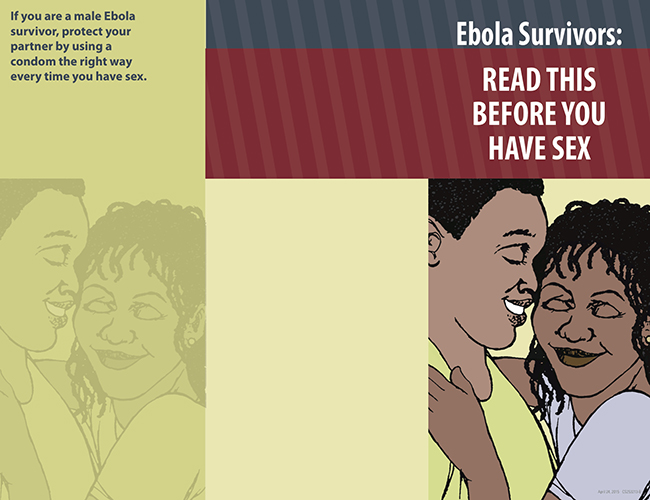 If you are a male Ebola survivor, protect your partner by using a condom the right way every time you have sex.
If you are a male Ebola survivor, protect your partner by using a condom the right way every time you have sex.
 If you are a male Ebola survivor, protect your partner by using a condom the right way every time you have sex.
If you are a male Ebola survivor, protect your partner by using a condom the right way every time you have sex.
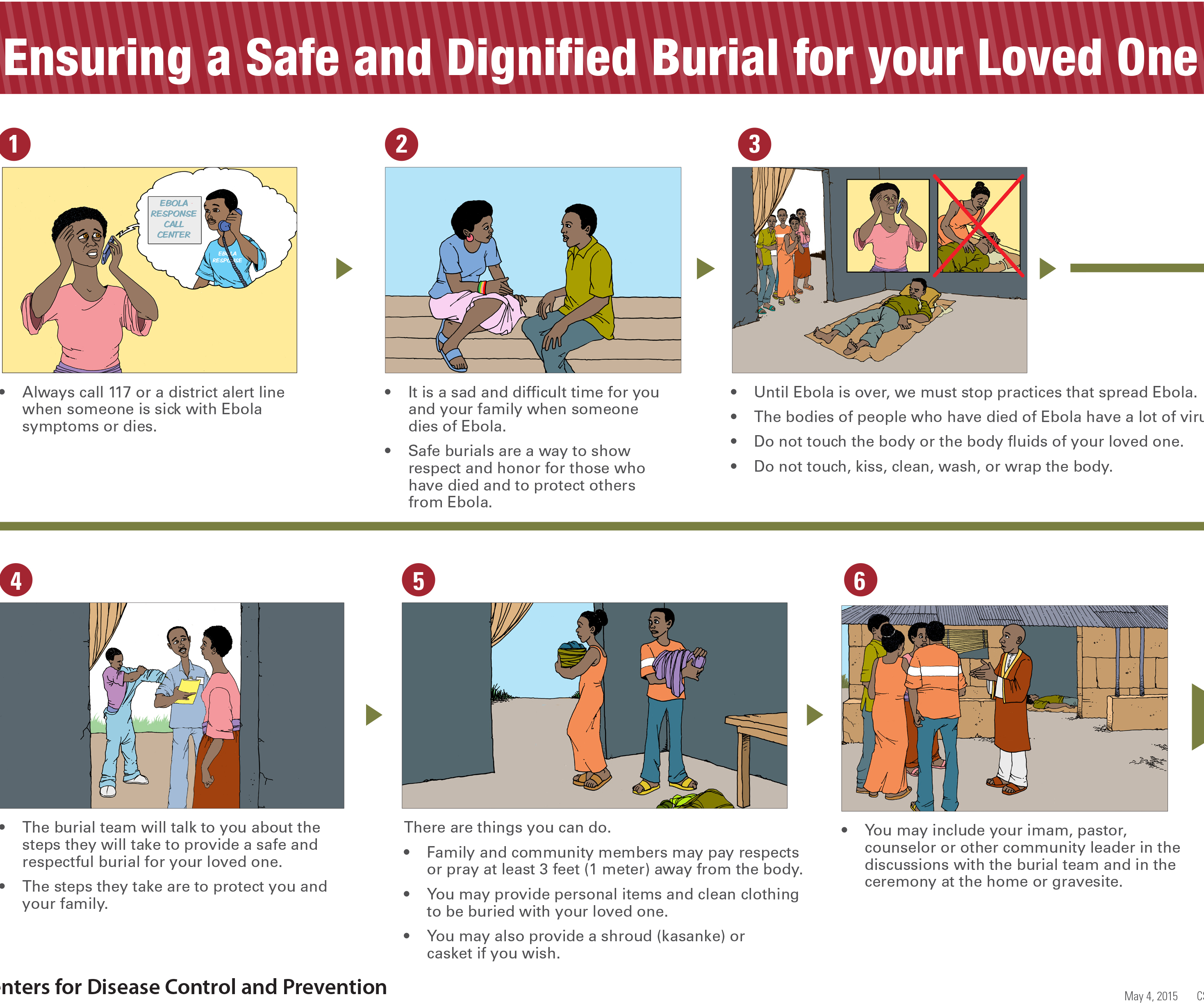
Safe burials are the way to show respect and honor to those who have died while protecting the living.
Infographic: Ensuring a Safe and Dignified Burial for your Loved One
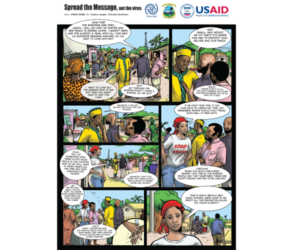 This is IOM Liberia’s most recent social mobilization tool, using storytelling as a means to pass on key messages to the community. The story focuses on the importance of health screening and adopting preventive behaviors when traveling across the border, both at crossing points and while abroad.
This is IOM Liberia’s most recent social mobilization tool, using storytelling as a means to pass on key messages to the community. The story focuses on the importance of health screening and adopting preventive behaviors when traveling across the border, both at crossing points and while abroad.
Medical Aid Films just released a short new animated film on Ebola in collaboration with the Earth Institute at Columbia University. The film is targeted to help educate communities in Guinea about “contact tracing,” vital work being done by health workers to find everyone who has been in direct contact with a sick Ebola patient in order to help stop spread of the disease.
Quoted from their announcement:
Our animation follows the story of a contact tracer, Mariam, as she goes about her work – visiting those who have come into contact with a sick Ebola patient, finding those who are showing symptoms, and arranging appropriate care for those who need it. The film will be used by the Government of Guinea and UNFPA in Guinea; and it is freely available in English and French for anyone to download and use, in both standard and mobile formats.
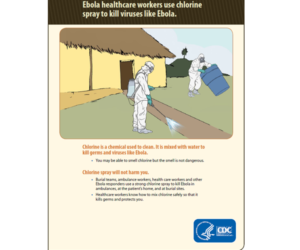 Poster describing the use of chlorine to kill viruses like Ebola. [Download]
Poster describing the use of chlorine to kill viruses like Ebola. [Download]
Consolidated Message Guide for Ebola Communication in Sierra Leone
Ebola messages based on their qualitative research done in hotspot areas of Bombali and Urban Freetown, Jan-Feb 2015.
[one_half]A set of empirically-derived Ebola messages for Sierra Leone [Download]
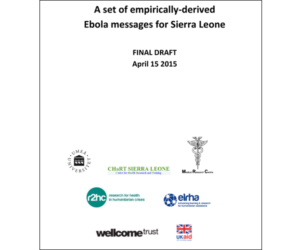
Social Mobilization in the Freetown Peninsula during the Ebola Epidemic 2014-2015
Ebola Response System Strengthening along Western Area Peninsula Coastline – LESSONS LEARNED
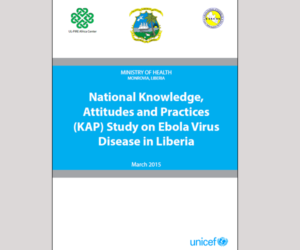 The Knowledge, Attitudes and Practice (KAP) study was conducted between December 7th and 22nd, 2014, to gauge the success of social mobilization efforts to educate the general public on key Ebola prevention messages in the country. The study design included quantitative and qualitative components. A questionnaire survey from a representative sample of 1,140 households was conducted in 6 purposely selected counties (Montserrado, Grand Gedeh, Lofa, Nimba, River Cess and Grand Cape Mount). Counties were selected to cover a range in the timing and impact of the Ebola epidemic in different parts of Liberia. The qualitative component was included to provide social context, collective understanding, and evolving debates behind static survey responses. It consisted of a series of 28 focus group discussions among 224 men and women conducted around the same time period in the same six counties. Groups were divided by gender and urban-rural residence, with additional groups for those in professional occupations. The topic guide generally followed a similar structure to the survey questionnaire in order to facilitate comparison across both data sources.
The Knowledge, Attitudes and Practice (KAP) study was conducted between December 7th and 22nd, 2014, to gauge the success of social mobilization efforts to educate the general public on key Ebola prevention messages in the country. The study design included quantitative and qualitative components. A questionnaire survey from a representative sample of 1,140 households was conducted in 6 purposely selected counties (Montserrado, Grand Gedeh, Lofa, Nimba, River Cess and Grand Cape Mount). Counties were selected to cover a range in the timing and impact of the Ebola epidemic in different parts of Liberia. The qualitative component was included to provide social context, collective understanding, and evolving debates behind static survey responses. It consisted of a series of 28 focus group discussions among 224 men and women conducted around the same time period in the same six counties. Groups were divided by gender and urban-rural residence, with additional groups for those in professional occupations. The topic guide generally followed a similar structure to the survey questionnaire in order to facilitate comparison across both data sources.
National Knowledge, Attitudes and Practices (KAP) Study on Ebola Virus Disease in Liberia

The Ebola Communication Network was originally developed by the Health Communication Capacity Collaborative (Cooperative Agreement #AID-OAA-A-12-00058) and expanded under Breakthrough ACTION (Cooperative Agreement #AID-OAA-A-17-00017) both under the leadership of Johns Hopkins Center for Communication Programs. This website is now maintained by Johns Hopkins Center for Communication Programs and its contents are the sole responsibility of CCP. The contents of this website do not necessarily reflect the views of USAID, the United States Government, or Johns Hopkins University.
